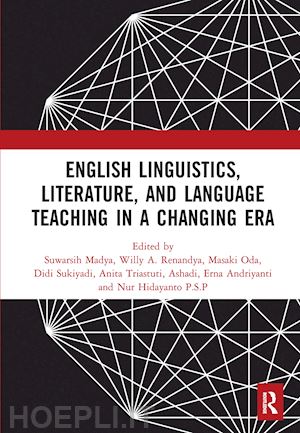Suwarsih Madya is a language teacher educator with a wide range of experience in international cooperation and language teacher education, both pre-service and in-service. She currently teaches language teaching methodology courses at Yogyakarta State University, Indonesia. Her recent books are Metodologi Pengajaran Bahasa: Dari Era Pra-metode sampai Era Pascametode (UNY Press, 2013) and Learning English Pronunciation Systematically: A Resource Book for Students Teachers and Teachers of English (UNY Press, 2017). She is currently involved in supervising the production of an online standardized test of English proficiency (TOEP) for national use. Dr Willy A Renandya is a language teacher educator with extensive teaching experience in Asia. He is a Principal Lecturer at the ELL Department at the National Institute of Education, Nanyang Technological University, Singapore. His most recent books include Simple, Powerful Strategies for Student Centered Learning with George Jacobs and Michael Power (2016, Springer) and English Language Teaching Today: Linking Theory and Practice with Handoyo P Widodo (2016, Springer). He manages a large online professional development forum "Teacher Voices": https://www.facebook.com/groups/teachervoices/. Masaki Oda is a Professor at the College of Humanities, Department of English Language Education in Tamagawa University. His areas of interests include what is defined as Applied Linguistics, Sociolinguistics, English as a lingua franca/World Englishes, Language Policy Teacher Education, Learner Beliefs. He is particularly interested in the relationship of power and language in society, both at a micro and a macro level, as well as studies in multimodal discourse and puts more emphasis on the process of learning rather than product. Didi Sukyadi is a Professor at Universitas Pendidikan Indonesia, with research interests in semiotics, multimodality, assessment and language teaching. He has contributed a chapter to Secondary English Education in Asia (Spolsky and Sung, 2015). At present, he is a vice president of Teaching English as a Foreign Language in Indonesia (TEFLIN), vice chief editor of the International Journal of Applied Linguistics, and the founder of the Conference on Applied Linguistics (CONAPLIN). Anita Triastuti is a senior lecturer in the English Language Education Department, Faculty of Languages and Arts, Universitas Negeri Yogyakarta, Yogyakarta, Indonesia. She obtained her doctoral degree from Macquarie University, Australia. Her research and teaching interests are in the areas instructional curriculum development, genre-based pedagogy, teacher knowledge, and TEFL. Ashadi is a senior lecturer in the English Language Education Department, Universitas Negeri Yogyakarta. He earned his doctoral degree from Melbourne University, Australia. His research interests are teacher professional development, teacher education, academic writing and qualitative approaches. He is currently the language service coordinator in the university’s graduate school and also managing a newly-established journal in language teaching studies namely Lingua Pedagogia.Erna Andriyanti teaches primarily linguistics subjects, including sociolinguistics, linguistics research methodology, and research proposal writing at the English Language Education Department and the Applied Linguistics Master’s Program at Universitas Negeri Yogyakarta, Indonesia. She obtained her doctoral degree from Macquarie University, Australia. Her research interest and thesis supervision are predominantly in the areas of sociolinguistics, multilingualism, educational linguistics, and cultural aspects in English language education in Indonesia. Nur Hidayanto Pancoro Setyo Putro is a senior lecturer at Yogyakarta State University, Indonesia. He holds a PhD degree from The University of New South Wales, Sydney. His interest is research in the areas of language assessment, measurement, and evaluation.











